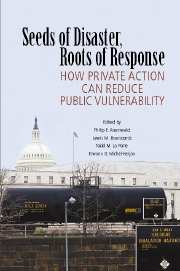Book contents
Preface
Published online by Cambridge University Press: 30 July 2009
Summary
Shortly after the September 11, 2001, attacks, the presidents of the National Academy of Sciences, the National Academy of Engineering, and the Institute of Medicine in the United States initiated a study of science and technology for countering terrorism. Lewis Branscomb, a co-editor of this book, and Richard Klausner were appointed co-chairs of the committee. The study team included more than 100 scientific and technical authors and 46 reviewers. Within seven months, the committee produced Making the Nation Safer: Science and Technology for Countering Terrorism, a report that focused on research and development strategies, describing actions to reduce immediate risks using existing knowledge and technologies and research to reduce future risks through the development of new capabilities. Many of the report's recommendations for research and development priorities were later incorporated into the science and technology strategy for the Department of Homeland Security.
Making the Nation Safer also highlighted a number of policy issues to be addressed for the nation's safety and security to benefit fully from any technical successes. Foremost among these policy issues was the role of private action in reducing public vulnerability. Then as now, most of the likely targets of terrorist attack are owned by private-sector firms. Furthermore, the severity of any attack (or, for that matter, of any major natural disaster) may be seriously aggravated by the disruption of critical services such as energy and water – services that are also mostly provided by private-sector firms.
- Type
- Chapter
- Information
- Seeds of Disaster, Roots of ResponseHow Private Action Can Reduce Public Vulnerability, pp. xvii - xxPublisher: Cambridge University PressPrint publication year: 2006



